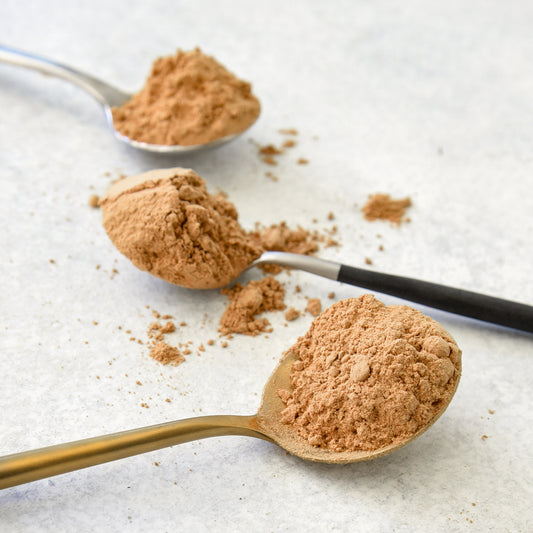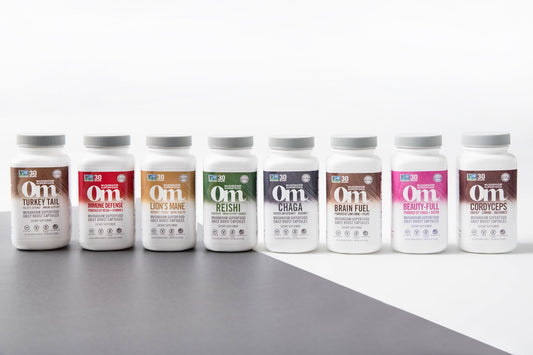At this time of year, many people are focused on supporting their immune systems. Through the winter months when colder weather necessitates spending more time indoors, taking extra precautions is a sensible and cautious approach to the season.
One of the best ways to enhance your body’s natural immune functions is with a mushroom powder supplement. Convenient and versatile, a functional mushroom powder provides a range of opportunities to beef up your wellness routine. By incorporating a daily dose, you can help to fortify your immune system with the benefits of this functional food.‡
If you have embraced the mushroom supplement trend, you may be wondering about mushroom supplement side effects. It’s clear that there are benefits to using functional mushroom supplements, but is it possible there are also associated risks? Although side effects are uncommon, continue reading to gain an understanding of possible issues.
The Historic Use of Functional Mushrooms
For thousands of years, mushrooms have served as food and been used for medicinal purposes in cultures from Europe and Asia to North and South America and the African continent. The use of mushrooms in the traditional medicinal practices of these diverse cultures was based largely on anecdotal records and word of mouth. From healers and shamans to family traditions, the power of these medicinal mushroom species was passed down through generations.
Though culinary mushroom use is quite common, the use of mushroom supplements has occurred more recently as modern scientific research has validated their traditional uses and explored additional applications. Easy to use in powder or capsule form, mushroom supplements can provide a variety of nutritional and medicinal benefits.‡ They are easy to incorporate into your daily health and wellness routine.
Possible Mushroom Supplement Side Effects
Mushroom supplements have many potential benefits. From nutrients like B vitamins and minerals to a wealth of bioactive compounds, some that are species-specific, mushrooms have a lot to offer. As with any natural product, however, there are a few things you should consider.
Source of Mushroom Supplement Products
Since wildcrafted mushrooms are fungi that grow in nature, they may be affected by the environment in which they are grown. Fungi serve as decomposers at the end of the food chain where they break down dead plant and animal material. As bio-accumulators, they may collect and accumulate toxins, heavy metals, and pesticides from their growth environment over time.
In order to ensure the safety and purity of your mushroom supplement product, you must consider the source of the mushrooms. Look for a source of functional mushroom supplements that are cultivated and processed under controlled conditions to avoid dangerous pollutants, heavy metals, and pesticides from their products. This will help protect you from the side effects of these dangerous substances. This will also prevent the possibility of a toxic mushroom species inadvertently being included in your mushroom product purchase as is the case with mushroom products that are “wildcrafted”, that is, collected in the wild.
Daily Dosage for Optimal Results
Though mushrooms are a natural food product, it is important to know the recommended daily dosage to optimize benefits. Too much of a good thing may cause side effects, while too little may result in a failure to achieve the desired response. Even overeating certain foods may cause temporary side effects, especially digestive upsets.
Support for Metabolic Health
Though some mushroom supplements support metabolic health in otherwise healthy people, they may have additive effects on people taking medication for various health conditions. While Maitake, for example, supports healthy blood sugar and weight management, it is not a substitute for medication.‡ If you are taking medications, we recommend that you consult your healthcare provider before taking a mushroom supplement.
Support for Gut Flora
Unfortunately, health benefits may become side effects under certain conditions. For example, if you significantly increase your fiber intake, it benefits your gut microbiome. Mushrooms have prebiotic fiber that supports microbial diversity.‡ Though this beneficial fiber supports gut health and digestion, it may initially cause some digestive upsets as the pathogenic bacteria are replaced with beneficial species. While this could be viewed as a side effect, it is generally short-lived and resolves within a week or so. Cutting back slightly, then increasing over time may help to minimize this effect.
Stimulating Focus
Since some mushroom powder supplements stimulate focus and support concentration, when you take them is important. Their stimulating properties may be considered a side effect if taken later in the day when you are trying to relax. For this reason, lion’s mane mushroom powder is best taken early in the day when its brain-supportive properties can help to power your day.‡
Individual Sensitivities
Some of the nutrients in mushroom supplements may affect those with specific medical conditions. Chaga is a mushroom species that many choose for its high antioxidant content.‡ However, it can contain a relatively high level of oxalates which may have negative effects for those with gout or people who have had kidney stones. Oxalates do bind with calcium, so consuming Chaga along with a food or drink with a high calcium content lessens the chance of kidney side effects. This is another example of when you should consult your doctor before adding this mushroom supplement to your daily routine.
As with any natural product, there may be individual sensitivities or allergies that result in side effects when they are consumed. Those who may experience a reaction such as itching or hives should discontinue mushroom supplement use and consult with their doctor. When in doubt, it is best to be proactive.
Effect on blood pressure and blood clotting
Mushrooms have blood pressure reducing activities and also anti-platelet aggregation activity that affects blood clotting. These activities are gentle and are health-promoting for most people. However, the effects can be additive to the effects of pharmaceutical drugs that are taken to address high blood pressure and blood clotting/thinning issues. If you are taking these sorts of medications it is important to consult with your doctor and carefully monitor any changes that may occur when supplementing with functional mushrooms.
Safeguarding Your Good Health
Mushroom powders may be used to support a variety of health and wellness goals. They are versatile and may be stirred into recipes, beverages, or smoothies. Another way to get the same quality mushroom powder is through convenient capsules. They provide a daily dose that is portable and easy to take.
For those who are new to mushroom supplements and concerned about potential side effects, the best course of action is to consult your healthcare provider prior to adding it to your daily routine. This is especially important for anyone with an underlying health condition, those taking medication, and women who are pregnant or breastfeeding. A little precaution can go a long way toward safeguarding your good health.
[CTA]
‡These statements have not been evaluated by the Food and Drug Administration. Functional mushroom products are not intended to diagnose, treat, cure or prevent any disease.












